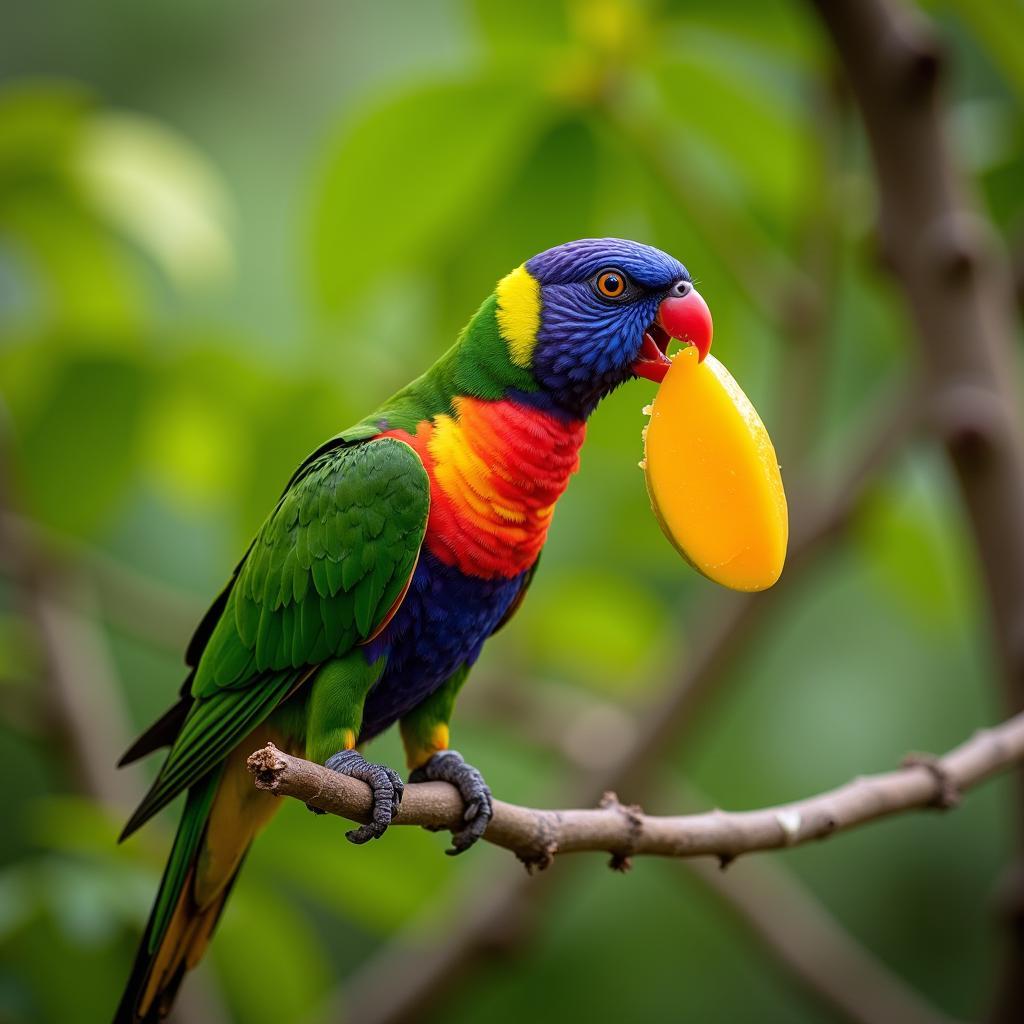Lorikeet Food is a fascinating subject, especially for bird enthusiasts and those caring for these vibrant creatures. Understanding their unique dietary needs is crucial for their health and well-being. This article dives deep into the world of lorikeet nutrition, covering everything from their natural diet in the wild to the best commercial lorikeet food options available.
What Do Lorikeets Eat in the Wild?
In their native habitats, lorikeets have evolved to thrive on a specialized diet. Unlike many other parrot species that primarily eat seeds and nuts, lorikeets are nectarivores, meaning they primarily feed on nectar from flowers. This diet is supplemented with pollen, fruits, insects, and occasionally seeds. Their specialized brush-tipped tongues are perfectly adapted for lapping up nectar and pollen.
The Importance of Nectar
Nectar provides lorikeets with the essential sugars and carbohydrates they need for energy. Different flowers offer varying nectar compositions, and lorikeets will often seek out a variety to ensure a balanced intake of nutrients.
Beyond Nectar: Other Dietary Components
While nectar forms the foundation of their diet, lorikeets also consume other foods to obtain essential vitamins, minerals, and proteins. Fruits provide additional sugars and vitamins, while insects offer a source of protein and essential amino acids. Pollen is another important source of protein and other nutrients.
Choosing the Right Commercial Lorikeet Food
Providing a balanced and nutritious diet for pet lorikeets can be challenging. Commercial lorikeet food, often available as a dry powder that is mixed with water, is designed to mimic their natural diet. Choosing a high-quality lorikeet food is vital for their health and longevity.
Key Ingredients to Look For
A good lorikeet food should contain a variety of ingredients that provide a complete and balanced nutritional profile. Look for formulas that include sources of protein, carbohydrates, vitamins, and minerals.
Avoiding Harmful Ingredients
Some ingredients can be detrimental to lorikeet health. Artificial colors, flavors, and preservatives should be avoided. Similarly, high levels of sugar or fat can lead to obesity and other health problems.
Supplements and Treats for Lorikeets
While a high-quality lorikeet food should provide most of the necessary nutrients, occasional supplements and treats can add variety and enrichment to their diet.
Safe and Healthy Treats
Fresh fruits and vegetables, in moderation, can be offered as healthy treats. Small amounts of insects can also be provided.
Supplements to Consider
Calcium and vitamin D supplements can be beneficial, especially for breeding birds. Always consult with an avian veterinarian before adding any supplements to your lorikeet’s diet.
What do lorikeets eat besides nectar?
Besides nectar, lorikeets eat pollen, fruits, insects, and occasionally seeds. This provides them with a more complete nutritional profile.
Can lorikeets eat fruit?
Yes, lorikeets can eat fruit, but in moderation. It provides them with additional sugars and vitamins.
 Lorikeet Enjoying a Piece of Fruit
Lorikeet Enjoying a Piece of Fruit
Conclusion
Providing the proper lorikeet food is crucial for their health and happiness. By understanding their dietary needs and choosing the right commercial food, supplemented with healthy treats, you can ensure your lorikeet thrives. Remember to consult with an avian veterinarian for personalized dietary recommendations.
FAQ
- What is the best lorikeet food? The best lorikeet food is one that provides a balanced and complete nutritional profile, mimicking their natural diet.
- How often should I feed my lorikeet? Lorikeets should have access to fresh nectar mix throughout the day.
- Can I make my own lorikeet food? While it’s possible, it’s challenging to ensure a balanced diet. Commercial lorikeet food is generally recommended.
- What fruits can lorikeets eat? Lorikeets can enjoy a variety of fruits like apples, bananas, and berries, in moderation.
- Are there any foods I should avoid giving my lorikeet? Avoid foods high in sugar, fat, and artificial ingredients. Also, avoid avocado.
- How can I tell if my lorikeet’s diet is adequate? A healthy lorikeet will have bright plumage, be active, and have regular droppings.
- Should I give my lorikeet supplements? Consult an avian vet before adding supplements to your lorikeet’s diet.
For any support, please contact us at Phone Number: 02437655121, Email: minacones@gmail.com, or visit our address: 3PGH+8R9, ĐT70A, thôn Trung, Bắc Từ Liêm, Hà Nội, Việt Nam. We have a 24/7 customer support team.